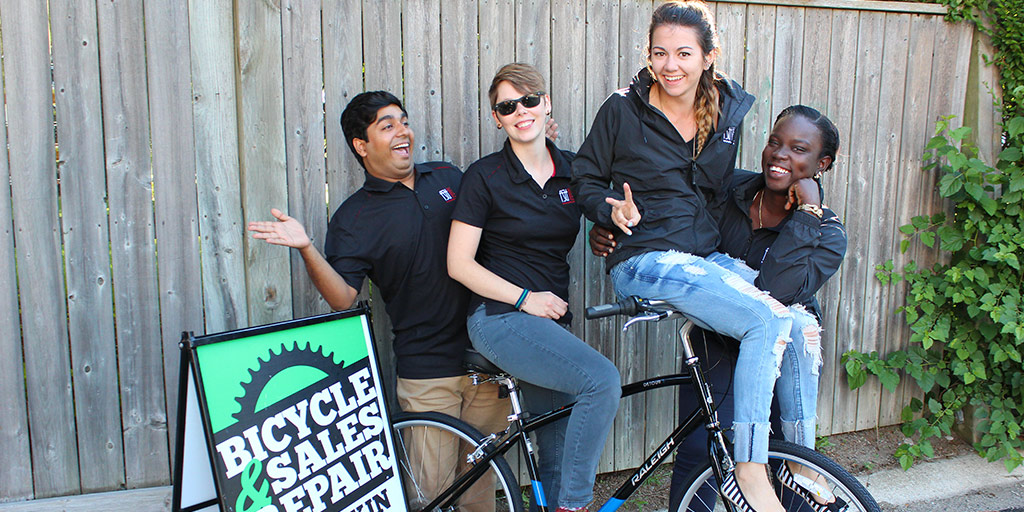Fanshawe shows its commitment to green transportation with a new bike share program
 CREDIT: JESSICA THOMPSON
CREDIT: JESSICA THOMPSONExecutives of the FSU sit on one of the 10 bikes that will be available for the FSU bike share program. Left to right; VP internal affairs Kevin Kaisar, president Carlie Forsythe, VP entertainment Morganna Sampson and VP finance Jahmoyia Smith.
Carlie Forsythe, president of the Fanshawe Student Union (FSU), has headed a new initiative to bring a bike share program to our college, called FSU Bikes.
“I am a bike enthusiast myself and I decided to create this program because the city of London is now leaning towards creating a bike-friendly culture and I felt that Fanshawe should get on board with another sustainability initiative,” Forsythe said.
As of Sept. 6, students will be able to borrow a hybrid bike from the Biz Booth for up to seven days. To accompany the different riding styles, the bike share program will launch with 10 hybrid bikes supplied by the FSU and Outspokin Cycles. All of the bikes will be given a tune up and a Fanshawe paintjob to make sure they are all in prime condition for the official launch of the program. To ensure the safety of students, all bikes will come with a bike lock, helmet, reflectors and bells. Baskets will also be available for any students wishing to do their groceries while biking around.
The bike share program comes to Fanshawe at the perfect time as the city of London is working on its own bike program to promote the culture and the safety of riders on roadways. London has been working hard at expanding their roads and adding bike lanes wherever possible.
“I found that the bike program meshed well with the city of London’s cycle plan to increase safety for cyclists. One of the examples of this is the expansion of Fanshawe College Boulevard to add a bike lane, which occurred this past summer,” Forsythe said.
Fanshawe will be joining the ranks of other Canadian campuses who have launched their own versions of the bike share program.
“I was inspired by the University of Guelph and their predominate bike culture on campus while I was there for a conference,” Forsythe said.
According to Forsythe, she created a report detailing the reasons why Fanshawe should have their own bike share program. The report outlined the benefits by exploring both Canadian and American campuses and city bike share programs.
The bike program is an important initiative for Fanshawe because it focuses on getting students into the communities and exploring our city. Many students living away from home are forced to rely on the bus system and taxis, which can be both restrictive and expensive. The bike share will give students a feasible and healthy alternative that lets them explore at their own pace.
The program also hopes to encourage students to leave their cars at home. Reducing the number of single-rider vehicles will have a positive impact on the environment and the infrastructure of Fanshawe campuses.
Although the idea looks great on paper, there are always concerns of costs. The FSU is doing all they can to reduce these fees or alleviate a price tag all together. They are providing this service completely free for Fanshawe students; all students have to do is have a valid student card and fill out a waiver form. While fellow campuses have membership fees and high rental costs, it is important to Fanshawe that students have a cost-effective method of sustainable transportation.
If the bike share program is successful, the FSU plans to expand the fleet and possibly start a second program at Fanshawe’s downtown campus. Having a bike share downtown will benefit students wishing to explore the area or skip the overly crowded bus to school. London has a rich and thriving downtown culture that has become much more supportive of bicycles so this seems like the perfect time for this new initiative.
If you are interested or would like to get involved in the bike share program feel free to get in touch with Carlie Forsythe in the Student Union offices located in SC2001. Fanshawe has a firm commitment to sustainable practices and wants to get the student body involved as much as possible.














